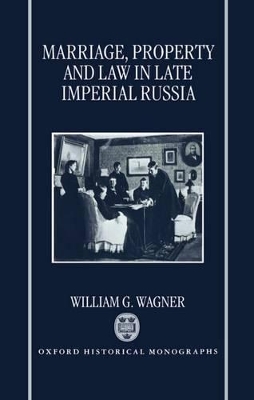Oxford Historical Monographs
1 total work
This is the first systematic study of civil law in late Imperial Russia. It shows that efforts to adjust family, property, and inheritance law to changing social and economic conditions often became intertwined with attempts to shape society in accordance with competing ideological ideals. Through a restructuring of the family's legal basis, members of the growing educated and professional strata of society in particular endeavoured to promote conflicting
coneptions of authority, individuality, gender, and law. Legal reform also served for members of the emerging legal and medical professions as a way to establish their authority, often at the expense of the state administration and the Orthodox Chruch.
Civil law in late Imperial Russia therefore constituted both an important medium for ideological redefinition and a field of battle for those seeking to reform, to overthrow, or to defend the ancien regime. Because this battle extended into the state bureaucracy, legislative change proved extremely difficult. Newly empowered by the 1864 judicial reform, the judiciar responded to legislative inaction by not merely adapting the law, but also by promoting an ideal of the family whose values and
principles challenged those underlying the autocracy. Professor Wagner's detailed and scholarly analysis of these issues offers many important insights into cultural attitudes and political structures in late Imperial Russia.
coneptions of authority, individuality, gender, and law. Legal reform also served for members of the emerging legal and medical professions as a way to establish their authority, often at the expense of the state administration and the Orthodox Chruch.
Civil law in late Imperial Russia therefore constituted both an important medium for ideological redefinition and a field of battle for those seeking to reform, to overthrow, or to defend the ancien regime. Because this battle extended into the state bureaucracy, legislative change proved extremely difficult. Newly empowered by the 1864 judicial reform, the judiciar responded to legislative inaction by not merely adapting the law, but also by promoting an ideal of the family whose values and
principles challenged those underlying the autocracy. Professor Wagner's detailed and scholarly analysis of these issues offers many important insights into cultural attitudes and political structures in late Imperial Russia.
